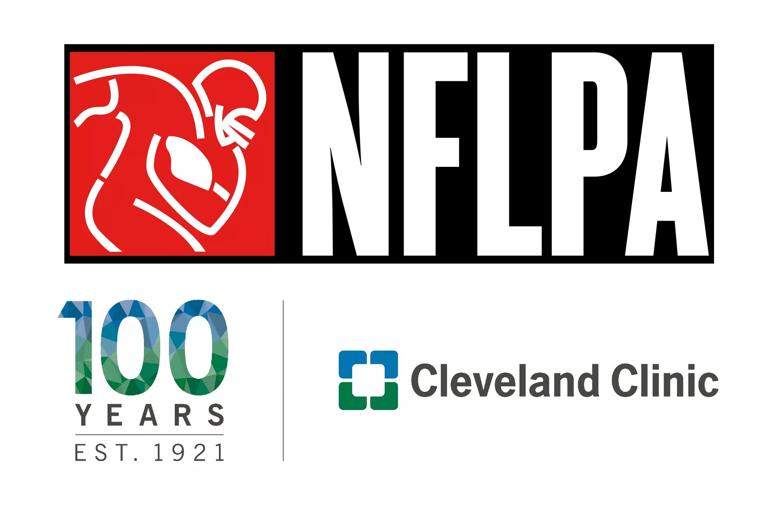New joint initiative aims to improve diagnosis and guide interventions

WASHINGTON, D.C. and CLEVELAND: As part of its continued efforts to prioritize the health and safety of its player members – past, present and future – the NFL Players Association (NFLPA) has teamed up with Cleveland Clinicon a joint initiative to use artificial intelligence to better characterize neurological disease. The goal is to improve diagnosis, prediction of disease progression and help guide treatments. The collaborative research aims to not only improve the brain health of former NFL players, but to enhance cognitive well-being among athletes in general and the larger community.

Image content: This image is available to view online.
View image online (https://assets.clevelandclinic.org/transform/225c841a-2a93-4397-ae39-47181ea17596/NFLPA_horiz_RC_jpg)
“Neurological diseases, such as Parkinson’s and Alzheimer’s, have become public health emergencies as our population ages, and they also are of utmost importance to the NFLPA,” said the initiative’s principal investigator, Jay Alberts, Ph.D., of Cleveland Clinic’s Lerner Research Institute and vice chair of Innovation for the Neurological Institute. “This collaborative research project will use machine learning techniques to address fundamental gaps in our understanding of disease processes and management. An ultimate goal of the initiative is for the created algorithms to support earlier diagnosis of neurological syndromes, enable better prediction of disease course and help guide interventions.”

Image content: This image is available to view online.
View image online (https://assets.clevelandclinic.org/transform/e0134611-8b1e-44e0-96c0-bfdd35c6c780/Alberts-Jay-110832_04-18-16_003_YKL_jpg)
Jay Alberts,Ph.D.
The initiative will develop machine learning algorithms related to cognitive impairment, using long-term patient outcomes data. The NFLPA and Cleveland Clinic collaborators will develop Explainable Artificial Intelligence (XAI) models while using machine learning tools and sources of data, such as demographics, patient-entered data, imaging and labs. When applied along with disease progression modeling, long-term pathological trajectories can be revealed from short-term clinical data, resulting in the development of transformative advances in the area of cognitive health.
The NFLPA and Cleveland Clinic also seek to engage other partners in the medical and analytic space, creating a coordinated research network that will evaluate and conduct phased research projects. The request for proposals that result from this venture will be published for additional machine learning and analytical projects specific to the identification of and insight into neurological disease progression, as well as corresponding treatment patterns.
The use of XAI techniques and machine learning tools offers an opportunity to build models using patients who did not play professional football while still informing potential prevention and treatment programs for the benefit of the current and former player population. The models also are being built for clinical integration to support physician decision-making. Ultimately and importantly, these models will aid in the care and treatment of individuals in rural and underserved communities.
“This partnership with Cleveland Clinic is an exciting extension of our union’s ongoing commitment to advancing the physical and mental health of our player members,” said NFLPA Executive Director DeMaurice Smith. “As the physician community learns more about neurological disease through the resulting clinical decision-support tools, the better informed we will be in providing education and safety initiatives for professional football players.”
Cleveland Clinic: Alicia Reale, 216.408.7444, realeca@ccf.org
NFLPA: Brandon Parker, 202.403.4779, brandon.parker@nflpa.com
About Cleveland Clinic
Cleveland Clinic is a nonprofit multispecialty academic medical center that integrates clinical and hospital care with research and education. Located in Cleveland, Ohio, it was founded in 1921 by four renowned physicians with a vision of providing outstanding patient care based upon the principles of cooperation, compassion and innovation. Cleveland Clinic has pioneered many medical breakthroughs, including coronary artery bypass surgery and the first face transplant in the United States. U.S. News & World Report consistently names Cleveland Clinic as one of the nation’s best hospitals in its annual “America’s Best Hospitals” survey. Among Cleveland Clinic’s 67,554 employees worldwide are more than 4,520 salaried physicians and researchers, and 17,000 registered nurses and advanced practice providers, representing 140 medical specialties and subspecialties. Cleveland Clinic is a 6,026-bed health system that includes a 165-acre main campus near downtown Cleveland, 19 hospitals, more than 220 outpatient facilities, and locations in southeast Florida; Las Vegas, Nevada; Toronto, Canada; Abu Dhabi, UAE; and London, England. In 2019, there were 9.8 million total outpatient visits, 309,000 hospital admissions and observations, and 255,000 surgical cases throughout Cleveland Clinic’s health system. Patients came for treatment from every state and 185 countries. Visit us at clevelandclinic.org. Follow us at twitter.com/ClevelandClinic. News and resources available at newsroom.clevelandclinic.org.
About the NFL Players Association
The National Football League Players Association is the union for professional football players in the National Football League. Established in 1956, the NFLPA has a long history of assuring proper recognition and representation of players’ interests. The NFLPA has shown that it will do whatever is necessary to assure that the rights of players are protected—including ceasing to be a union, if necessary, as it did in 1989. In 1993, the NFLPA again was officially recognized as the union representing the players and negotiated a landmark Collective Bargaining Agreement with the NFL. The current CBA will govern the sport through the 2030 season. Learn more at www.nflpa.com.